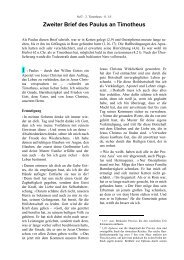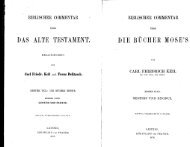Create successful ePaper yourself
Turn your PDF publications into a flip-book with our unique Google optimized e-Paper software.
The Bible and blood: Having explored the fundamental<br />
importance of the blood for all physiological<br />
processes in the body, we now have an<br />
entirely new approach to biblical passages which<br />
mention blood. We read in Deuteronomy 12:23:<br />
“the blood is the life”. Consistent with what we<br />
have now learned of the vital role of blood, the<br />
Bible regards blood as the seat of life.<br />
After Cain had killed his brother Abel, God<br />
accused him with the words: “Your brother’s<br />
blood cries out to me from the ground” (Gen<br />
4:10). In Genesis 37:27 the following turn of<br />
phrase is used to indicate family relationship: “...<br />
our own flesh and blood”. Human life is precious<br />
to God, Who prohibits human sacrifice (Deut<br />
18:10) and cannibalism. Anybody who sheds<br />
human blood, violates God’s image and thus the<br />
Creator Himself, Who will then avenge the shed<br />
blood: “Whoever sheds the blood of man, by man<br />
shall his blood be shed; for in the image of God<br />
has God made man” (Gen 9:6). God empowered<br />
human authorities to fulfil this task; they have<br />
been commissioned by God to bear the sword to<br />
redress evil. When the authorities justly punish<br />
evildoers, they do so for our benefit (Rom 13:1-4).<br />
The blood of the martyrs (the prophets and others<br />
who were witnesses for Jesus) is especially<br />
mentioned. In Matthew 23:35 Jesus accuses the<br />
scribes and the pharisees: “And so upon you will<br />
come all the righteous blood that has been shed<br />
on earth, from the blood of righteous Abel...” In<br />
Revelation the blood of the witnesses of Jesus is<br />
mentioned often, those who lost their lives for<br />
the sake of the Word of God (Rev 6:10, 16:6,<br />
17:6, 18:24, and 19:2).<br />
In the Old Testament God emphasises the value<br />
of blood. Before the exodus of the Israelites from<br />
Egypt, God told them to smear the blood of the<br />
passover lamb on the tops and sides of their<br />
doorframes. “The blood will be a sign for you on<br />
the houses where you are; and when I see the<br />
blood, I will pass over you. No destructive plague<br />
will touch you when I strike Egypt” (Exodus<br />
12:13). In all other houses the firstborn died.<br />
This was a concealed reference to the saving<br />
64<br />
blood of the perfect Lamb, namely the blood of<br />
Jesus. In the eyes of God there is no forgiveness<br />
without the shedding of blood (Hebrews 9:22).<br />
The Son of God thus had to be incarnated in<br />
human form to bring the only sacrifice that<br />
could save us. After He had risen from the dead,<br />
He asked the disciples going to Emmaus: “Did not<br />
the Christ have to suffer these things and then<br />
enter his glory?” (Luke 24:26). The blood of Jesus<br />
(Hebr 10:19, 1 John 1:7) as well as all its synonyms<br />
like the blood of Jesus Christ (1 Peter 1:2),<br />
the blood of Christ (1 Cor 10:16, Eph 2:13, and<br />
Hebr 9:14), and the blood of the Lord (1 Cor<br />
11:27), occupy a central place in the New Testament.<br />
All these concepts are abbreviations for the<br />
blood shed by Jesus Christ, his death and selfsacrifice<br />
on the cross of Calvary for the sins of<br />
a lost humanity. The real meaning of the blood of<br />
Jesus can be summarised as follows:<br />
1 The blood which Jesus shed for us is the price<br />
He paid for our salvation. It is the only way of<br />
obtaining eternal life: “For you know that it was<br />
not with perishable things such as silver or gold<br />
that you were redeemed..., but with the precious<br />
blood of Christ” (1 Peter 1:18-19). “Nothing<br />
impure will ever enter it (heaven)..., but only<br />
those whose names are written in the Lamb’s<br />
book of life” (Rev 21:27). We can only enter heaven<br />
when we are purified, and this has been<br />
accomplished by Jesus: “The blood of Jesus, his<br />
Son, purifies us from all sin” (1 John 1:7).<br />
2 The sacrifice of Jesus paid our debts before<br />
God. Not only are our personal sins taken away,<br />
but Jesus bore the punishment for the entire lost<br />
human race: “Look, the Lamb of God, who takes<br />
away the sin of the world” (John 1:29). The widereaching<br />
impact of Jesus’ act of redemption is<br />
expressed clearly in Romans 5:18: “Just as the<br />
result of one trespass was condemnation for all<br />
men, so also the result of one act of righteousness<br />
was justification that brings life for all men.“<br />
His sacrifice is sufficient for all humanity. Unfortunately<br />
only a few avail themselves of this<br />
opportunity (see Matthew 7:13-14, and paragraph<br />
7 below).<br />
3 The result of man’s sin was a deep, unbridge-
















